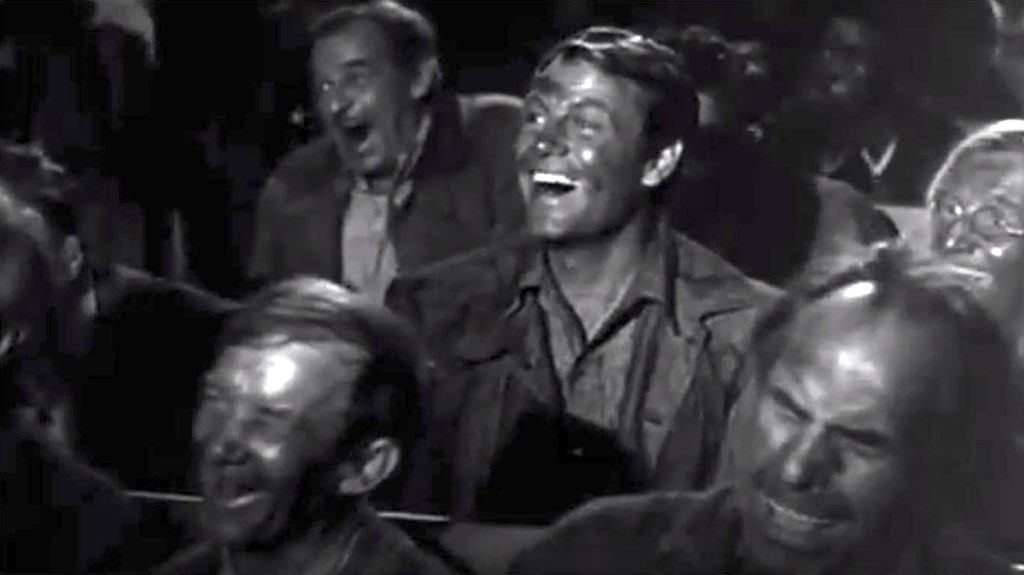I take umbrage with the Vatican’s “best films” list. To channel the late great Groucho Marx, if I have taken umbrage, then I ought to give it back. I have no issue with 99% of the films on the Vatican’s list. It is another percentage that bothers me. Out of all these films, only 4.44444444% are comedies. I can begin my own movement and advocate for a synod on cinema silliness.
Seriously, I think the problem with the list is that it’s too, well, serious. The other problem is that most comedies made after 1959 would not make a Vatican list for a lot of reasons other than just being comic. So, as I am wont to do, I suggest we climb inside our own “way back” machines and submerge ourselves in light, comedic entertainment as a kind of cultural palette cleanser over the current state of news.
Take the 1941 Preston Sturges classic, “Sullivan’s Travels.” The plot is pure Hollywood. A movie director, famous and wealthy for making lighthearted and silly comedies, has fame, the requisite mansion, and even a servant. His movie mogul bosses love him, not for who he is but for what his talents have garnered for them in box office receipts.
But the director character is unhappy. He wants to be taken seriously and longs for the opportunity to make his first dramatic film about man’s inhumanity to man. This causes everyone in his orbit to panic. They want to stop him from making a big mistake, not so much for what this artistic misstep might mean to the director’s life, but because of what this will do to their bank accounts.
Undaunted, the director goes undercover and incognito to live as the downtrodden man he wants to capture on film, and plot complications ensue. It is a Hollywood movie from the golden age, so there are twists and turns and, of course, a love interest. Toward the end of the film, the director, now a full-fledged nobody, finds himself in a chain gang accused of his own murder. Stay with me — yes, this film is more comedy than drama.
The climactic scene, when the director, in a fog over all that has happened to him, is escorted into a Black church in the deep South. At the time this film was made, this portrayal of African Americans as dispossessed but dignified was revolutionary in and of itself.
The director shuffles his way into the church, joined via shackles to all the other chain gang members. They are a sullen and hopeless bunch. They sit down in mismatched chairs, and a bed sheet is strewn across the wall they face. The African American preacher turns on a 16mm film projector and the inmates are shown a cartoon. One by one and little by little, the convicts start to laugh at the silly antics of the animated characters. The director, jaded as he is, will only offer a chuckle, but soon he laughs as hard as the others.
You guessed it: He realizes that sometimes a little silliness and comic relief is necessary when times are hard. In 1941, when this film was made, there were some pretty hard times behind and in front of our country, and the escapist nature of films like this was as medicinal as they were entertaining.
And as old as these comedies are, many of them stand the test of time. That is why I am escaping these days into my “vault” and dragging out the Marx Brothers, Buster Keaton, Laurel and Hardy, and others. When the Marx Brothers made “A Night at the Opera,” there actually were Nazis on the other side of the Atlantic, and they were in ascendance.
If you do not have a library of DVDs full of these kinds of films, what is wrong with you? Doesn’t everybody have a copy of “Horse Feathers?” Or a complete collection of Laurel and Hardy shorts?
We know Jesus wept, but he also knew there was a time for everything: “Blessed are you who are now weeping, for you will laugh” (Luke 6:21). The gift of laughter is divinely ordained, and whatever troubles anyone, a dose of laughter is not just a trifle but a tonic for body and soul.

